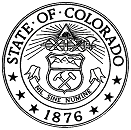![]() The information on this page is archived and provided for reference purposes only. It may be outdated or no longer maintained.
The information on this page is archived and provided for reference purposes only. It may be outdated or no longer maintained.
Colorado resolves all voter registration claims, save one
Buescher credits transparency and says state has improved voter safeguards
Denver, January 25, 2010 – Today, Secretary of State Bernie Buescher announced that the state has settled three of the four claims filed by Colorado Common Cause and other groups just prior to the 2008 General Election.
“This compromise really helps to get both parties what we want and further improves voting safeguards,” Buescher said. “First, the state has expended significant resources through staff time and our attorneys’ costs to work through these claims. In tight budget times, our resources are wearing thin and this allows us to concentrate on working with the county clerks to run Colorado’s elections efficiently. Second, the agreement is timely as we transition to another busy election year. As we continue to work to achieve a successful resolution on the last claim, my staff can begin to refocus on our election duties. Finally, Colorado voters can continue to be confident in the state’s commitment to accurate voter rolls and our agreement to further strengthen the safeguards already in place.”
The 15-month old case claimed that Colorado was wrongfully removing voter records within the 90-day window prohibited by the National Voter Registration Act. The state argued that this was a result of Colorado’s recent transition to the new federally-mandated statewide voter registration system, which consolidated each of the 64-county voter rolls into one, real-time state voter list. As outdated and duplicate voter records were identified across county lines, one person could have had an incomplete vote history. Once identified, these records were consolidated into one complete voter history record.
“Federal law mandates that each voter have only one, complete voter record,” Buescher said. “Colorado’s county clerks are committed to following state and federal law to ensure compliance and legal access to the polls for those that want it.”
Common Cause was joined in the suit by Mi Familia Vota Education Fund and Service Employees International Union. The plaintiffs were represented by lawyers from the Advancement Project, the Brennan Center for Justice at New York University School of Law and Fair Elections Legal Network. In all, 17 lawyers from San Francisco to New York to Washington, D.C., were involved in the suit against the state.
“For over the past year, we confidently kicked open the door to the state’s election procedures and voter registration practices to explain our processes to the out-of-state lawyers,” Buescher said. “Colorado’s county clerks and my staff worked cooperatively with the plaintiffs and meticulously went through the state’s laws and election practices. I think this process benefited both sides as we worked to identify in detail the best practices used and areas that can be clarified and improved upon. In the end, we clarified our rules and maintenance procedures, and as a result Common Cause and the other plaintiffs dropped the majority of their claims.”
The three claims that both parties agreed to settle involved the state’s practices of consolidating duplicate voter records and procedures for handling inactive voters. Over the past year, Buescher promulgated rules clarifying the processes dealing with these voter records and further defining list maintenance protocols.
“Certainly, the politics and hype surrounding this case may have been overblown,” Buescher said. “However, Colorado has made improvements and I can confidently say Colorado’s county clerks are leading the nation in our voter registration practices and safeguards. We can continue to have great confidence in our elections for years to come.”
The remaining claim challenges a state law that prevents a new voter registration for an applicant whose first mailing is returned as undeliverable within 20 days of being sent. When a citizen submits a voter registration form to a county clerk’s office, a voter information card is sent confirming the registration. Under current law, if that card is returned as undeliverable, the registration is not completed and that person remains ineligible to vote.




 Menu
Menu  Search
Search 
